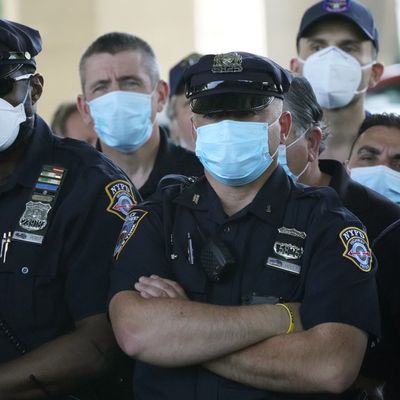
The hottest issue in American politics at the moment is the call by some protesters against racial violence to “defund the police.” Polls show it’s not a very popular idea. Republicans are planning to campaign against it with the slogan “defend the police.” Democrats (including Joe Biden and congressional leaders) are hastening to say they want to reform, not defund, the police.
But despite all the distancing and denouncing we are witnessing, the police may indeed be “defunded” in many cities soon, in the sense of being hit with major budget cuts that force a reconsideration of their missions and use of force. As Peter Beinart points out, it’s less about social policy than money:
Police budgets are mostly paid by local governments. And for local governments, COVID-19 has been a fiscal catastrophe. Local governments fund themselves through a combination of property taxes, sales taxes, income taxes, special taxes (on the occupants of hotels, for instance), and aid from states. By slashing consumer spending, the pandemic has slashed sales-tax revenue. The collapse of tourism has decimated special taxes paid by the hospitality industry, and job losses have reduced revenue from income taxes. Moreover, states—which face their own budgetary shortfalls—are likely to cut local aid. The result, according to the National League of Cities, is that from now until 2022, cities collectively face a budgetary hole of $360 billion.
In that kind of fiscal climate, even sacred cows (as police budgets have been in many cities) are going to give up a pound of flesh. And it’s already happening, particularly in cities (like Los Angeles, New York, and Boston) where responding strongly to the George Floyd protests is good politics, too.
But here’s where the story gets weird: Congressional Democrats, who are eager to appropriate a sizable amount of coronavirus stimulus money to help state and local governments in the pandemic, may indirectly become the saviors of local police budgets. And congressional Republicans and their leader in the White House may not be helping to “defend the police” if they refuse, or at least drag their feet, on such assistance:
In April, McConnell suggested that states respond to their fiscal woes by declaring bankruptcy. Earlier this month, Chuck Grassley, the Republican chairman of the Senate Finance Committee, cited a better-than-expected May jobs report as evidence that Congress should “not rush to pass expensive legislation paid for with more debt.”
That means many cities must make large cuts soon. Budget crises alone may not have led to lower police funding, and protests alone may not have, either. But they form a potent combination.
Presumably, police unions will get that point across. It’s theoretically possible that Republicans can come up with some highly conditional formula for state and local aid that skews toward their own priorities, including police and fire services. But they have to get it past Senate and then House Democrats, while eating an awful lot of words said about giving states and localities flexibility in using federal funds. More likely, they’ll just come around to more general state and local aid at some compromise level, or hold the line on spending and let their friends in blue take a hit. Otherwise they may see headlines that read: “Mitch McConnell defunds the police.”






























